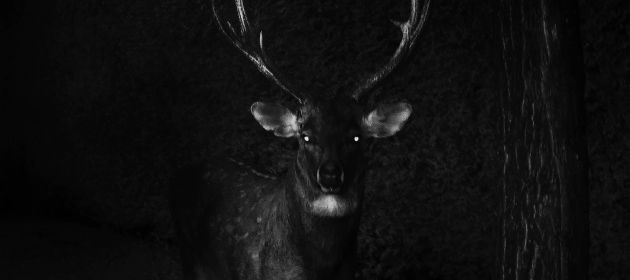A Psychedelic Coming Out: „I Take Mushrooms. Here’s Why I Do It“

„Unable to remember my name, I lay on the floor with my eyes closed and stared at a glowing tunnel of light. It seemed that I had no body. My face was flooded with tears, as I repeated: „This changes everything… this changes everything…“ The next morning, it was hard to believe the intensity of my experience from the night before. Getting to know psilocybin mushrooms has forever changed my perception of the world, but it took years to figure out what had happened to me that evening.“
For the last 10 years, I have been studying the psychophysiology of psychedelic experiences. During this time, I’ve taken magic mushrooms about 50 times. I’ve seen psychedelics from different angles. If these substances are misused, a person can experience intense fear and even develop a mental trauma. But many people who used a psychedelic drug describe the experience as among the most spiritually significant of their lives. And one of those people is me.
As a child, I internalized beliefs about the world’s hostility and developed a low sense of self-worth. I was so antisocial that I couldn’t finish school and dropped out in seventh grade. I was nervous, inattentive, and timid, and there was so much shaming and bullying directed at me. I didn’t know how to talk to adults and ask for help. When it became unbearable for me to be at the bottom of the social hierarchy, I just stopped showing up at school. My parents took pity on me and allowed me to leave school. Gradually this belief took hold in me: I was a hopeless weakling, and the best way of handling personal difficulties was to avoid them.
I missed out on critical social skills development, and this hindered me all my life. Being 184 centimeters tall, I felt small next to others. I made up stories about myself so that friends wouldn’t think of me as a creep. The feeling of my own inferiority accompanied me until my internal world crumbled under the influence of psilocybin mushrooms.
The feeling of my own inferiority accompanied me until my internal world crumbled under the influence of psilocybin mushrooms.
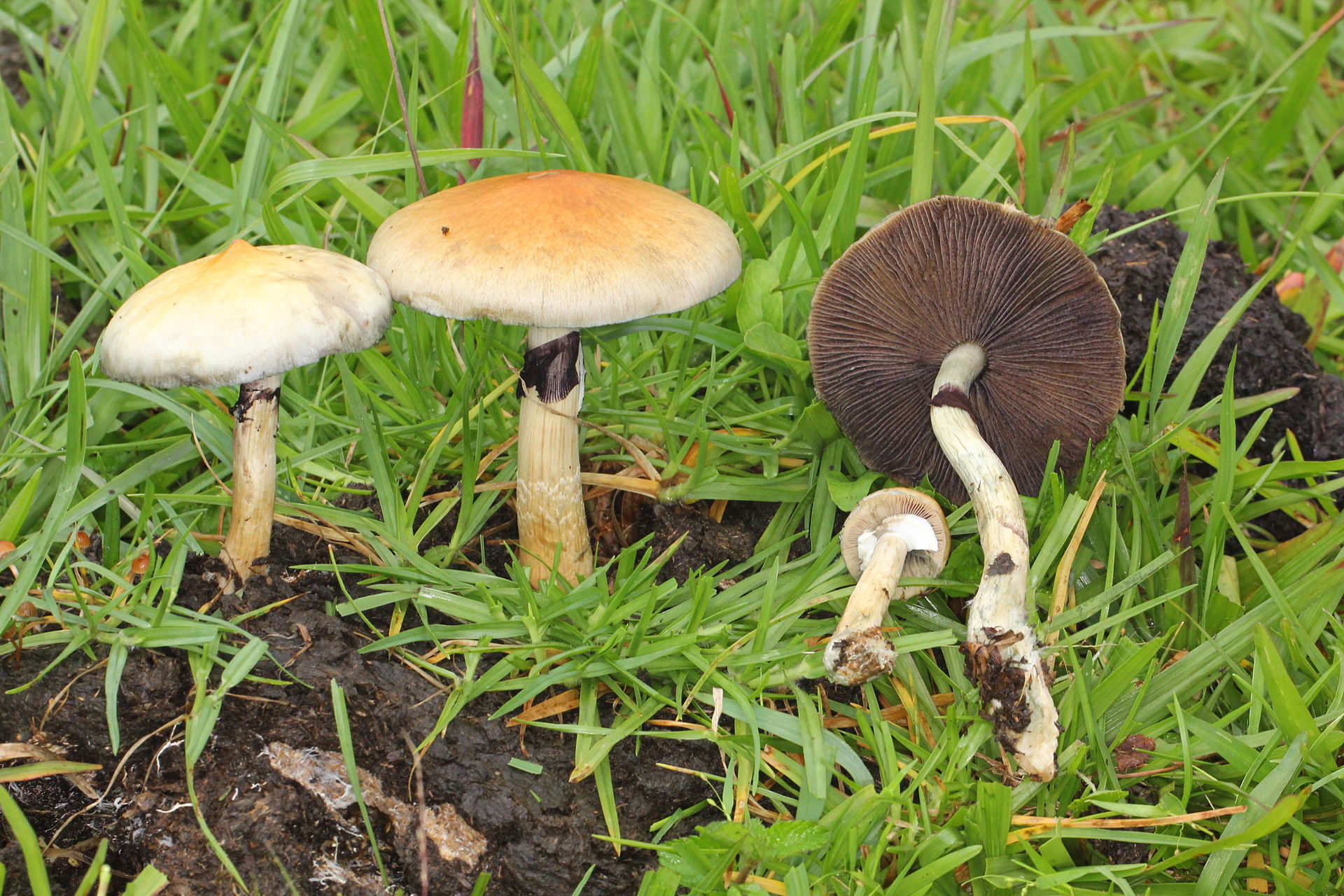
The psychedelic experience’s fantastic nature rewrote my ideas about the world and myself, about what was possible and what was not. Now I live with a feeling that life is a continuum of endless possibilities. Any future that I can imagine is possible. This is my superpower. The psychedelic experience became a meeting with myself, a session of letting go of pain, anger, and resentment, the practice of forgiveness, delight, love, and gratitude. From this point, I made many decisions about how to live my life, got to know myself from a new angle, and realized what I really want.
I decided to write this text because I believe that psychedelic therapy will become the most effective psychotherapy area in the coming years. Many are unaware of the healing potential of psychedelics because they do not understand how this works. The result depends on how you use the tool, you can’t just eat mushrooms and get a quality experience. Psychedelic therapy is a sophisticated mind-altering technology that produces predictably beneficial results only when the ritual is properly conducted.
How to take mushrooms and not go crazy
The design of the ritual is scientifically called set and setting. We learned this from the Indians, who have kept the mushroom ritual’s ancient tradition to this day. For 10 thousand years, the ceremony’s direction has not fundamentally changed; only now, instead of a fire there is a warm lamplight; instead of drums, there is a hi-fi audio system, and the shaman has a degree in psychology. Psilocybin is usually served not in mushrooms but a capsule; it is placed in an ancient carved goblet to preserve the atmosphere of mystery.
The emotional environment in the room and all the details of the interior matter. If the session takes place in a clinic, the ward is turned into a cozy space decorated with art objects. If you attempt to remember who you are and what the hell is going on during the third hour of a trip, the atmosphere will remind you that you are participating in a sacred ritual rather than dying from some poison in intensive care. There will be people who will take care of your body while you are on a psychedelic odyssey.
You need complete concentration, so you put on an eye mask and headphones. The music playlist is designed to calm you down or stimulate emotional catharsis at the right time.
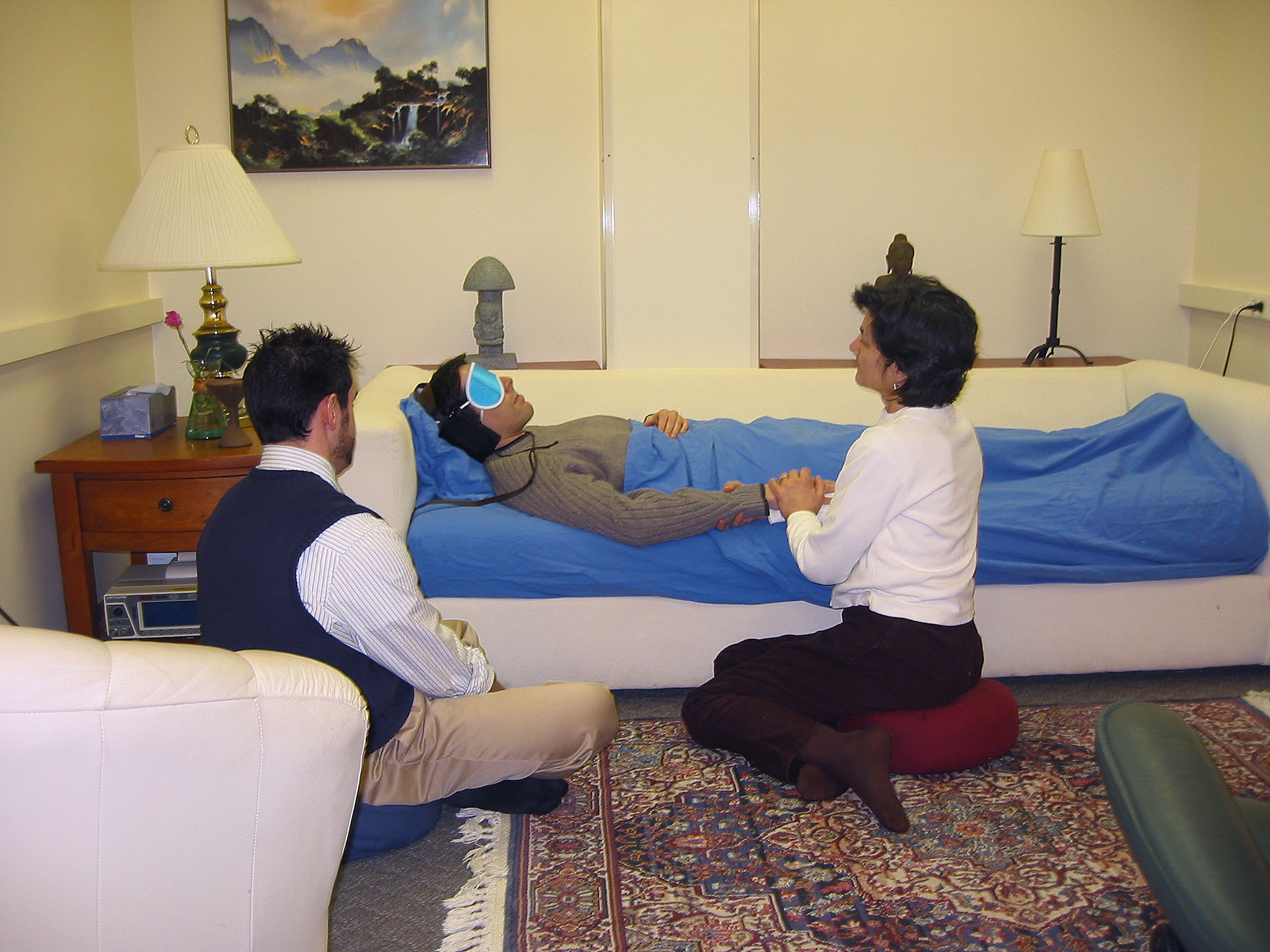
Without knowing the technology, it’s easy to make mistakes. A person who had a bad trip (a frightening and unpleasant experience) will usually tell you something like this: „I was among people I did not trust», «I mixed psilocybin with alcohol,“ „Everything was fine until the car caught fire.“ Taking psilocybin without an experienced guide can be dangerous, but problems rarely arise in clinical practice. According to various sources, over the past 10 years, more than a thousand people have participated in psilocybin studies. There has not been a single case of complications or negative side effects. In the 1960s, Czech psychiatrist Stanislav Grof conducted 3,000 psychedelic sessions, only three of which had to be interrupted by administering a tranquilizer due to the patient’s severe panic.
Death rehearsal
In one study, psilocybin was given to 36 healthy, educated adults. Six months later, in a survey, a third of them called this experience the most important event in their lives. In terms of the depth of influence on their personality, some experiment participants compared the trip with the birth of their first child or a parent’s death.
What is so important about hallucinations?
In short: first, you get access to the database of your own brain, and then you die. You die psychologically — this phenomenon is called „ego death“ or „ego dissolution“. But first things first. A psychedelic trip is a heroic story with a traditional introduction-setup-climax-resolution structure: the plot unfolds gradually.
Introduction
The term „psychedelic“ is derived from the Ancient Greek words psyche („soul“) and deloun („to make visible,“ „to reveal“). This term originated as an alternative to the designation „hallucinogen“. Psilocybin mushrooms alter your perception of reality, but you won’t see any elves or dragons around, and you won’t confuse the door with the window. So how exactly can they trigger a soul manifestation?
In the 1950s, the British psychiatrist Humphry Osmond, who invented the term „psychedelic“ and famously assisted the writer Aldous Huxley in experimenting with mind-altering substances, formulated the pressure reducing valve hypothesis. The idea is that there is some valve in the brain that keeps the pressure of reality from fully entering the consciousness so that in this ocean of stimuli we can focus on something. The psychedelics open this valve, and information, which is usually processed unconsciously, begins to flow into consciousness.
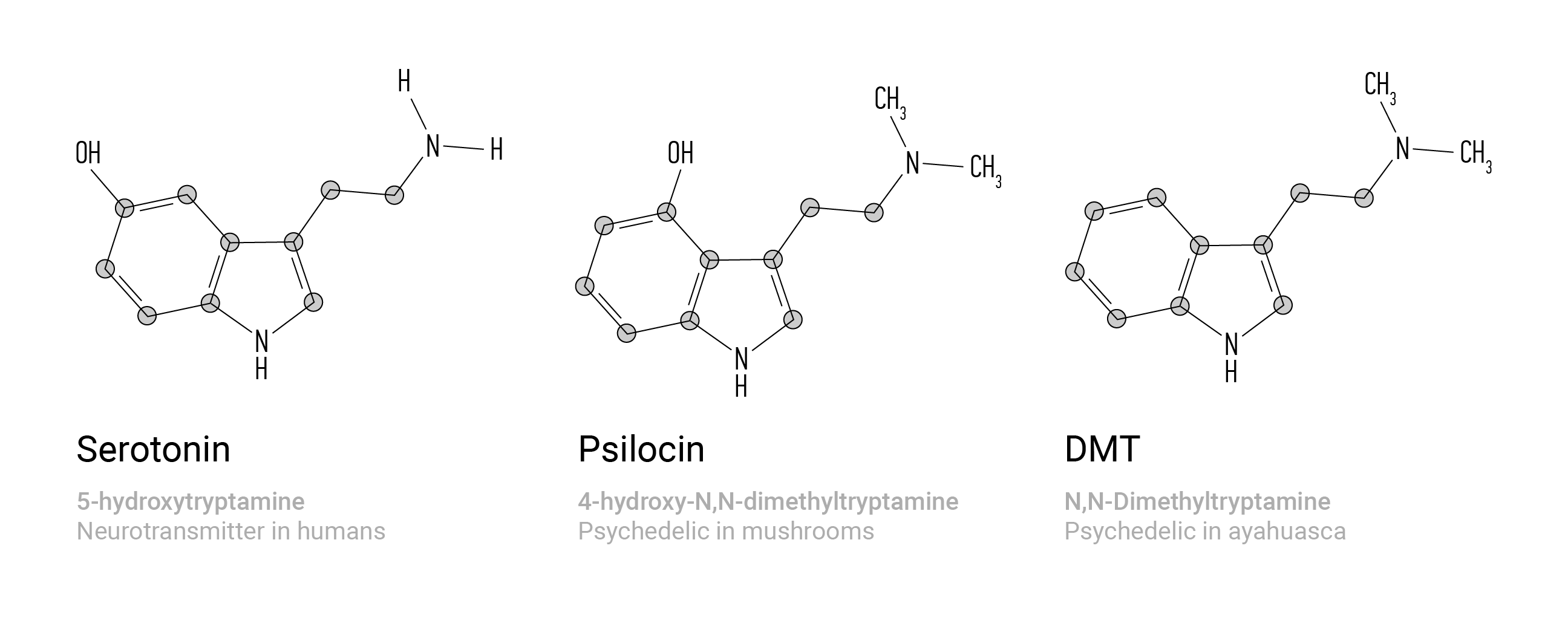
Half a century later, we learned that the brain has an incredibly complex system of receptor valves. Receptors are activated by neurotransmitter molecules, increasing or slowing down the transmission of signals between neurons.
One such molecule is serotonin. To put it simply, serotonin inhibits signal spreading in the cerebral cortex to suppress mental processes’ noise and highlight the most important things in consciousness. Among serotonin receptors, there is a special type — 2A. This receptor is now generally considered to be the key target for psychedelics. The psilocin molecule essentially mimics the serotonin molecule. It sticks into the receptor, opening the floodgates to the pressure of reality. Subjectively, this is exactly how it feels.
Setup
When psilocin comes into play, the resolution of reality seems to increase many times over. The visible blooms in patterns. One’s own personality is unpacked into a huge fractal of connections between past and present experiences. Memories, images, and associations emerge, forgotten feelings are revealed.
Moving from one room to another can seem like a long journey because, on the way, you have time to think about a huge number of things and experience the smallest emotional fluctuations. You always think and feel it all, but so quietly that you don’t even notice it.
Research suggests that psilocybin, the main psychoactive ingredient in magic mushrooms, sprouts new links across previously disconnected brain regions, and you experience synesthesia — a mixture of feelings. For example, you may close your eyes and see the music’s geometry because the visual cortex processes some of the sound information. The music permeates you, the process unfolds quickly, and you are drowned in a stream of sensory experience. The signal spreads more and more, enveloping the farthest nooks of consciousness, weakening the current in the default mode network — the neural network in which the ego lives.
In every moment, the ego tells me who I am, according to a whole set of beliefs and assessments. It builds a model of me, based on what I think about myself; what others think of me; what I think about what others think of me; what is me and what is not me; what size I am; where and when I am. Under the influence of psilocybin, all of this begins to dissolve. Here is where the hero meets his test.
Climax
At this point, you may feel fear because it becomes difficult to determine whether you are asleep or awake, alive or dead. The personality begins to resist to avoid disappearance by clinging to what we perceive as „normal reality“: starting a conversation, endlessly glancing at the clock, going somewhere. This is a mistake; at best, you will not be able to concentrate on the experience, and you will not learn anything; at worst — disorientation will increase, fear will grow, and a panic attack will begin.
You need to lie down and try not to move.
„Trust,“ „let go,“ „be open,“ „breathe,“ „surrender“ are the main words that you want to hear at this moment. You need to let go of control, let yourself be taken away. The sense of time will disappear, and you will find yourself in eternity. The body’s outline will disappear, and it will seem that you have neither beginning nor end. The border between the perceiving subject and the perceived object will be erased; you will cease to feel like a separate being; it will turn out that all of this is you.
A psychedelic experience cannot be described in words without it sounding like a mystical delirium. Somehow it turns out that I disappear, but my consciousness stays right here. Everything merges into unity, it seems that I am the universe, and Sasha Astron is an avatar whose life I dream about. Sasha just took mushrooms, and I woke up inside a dream. I see my infinity through his eyes; I see myself in flowers and stars, in all the people and animals. I feel like I will never die — the avatar will die, but the rest of me will live. It’s hard to hold back tears when I think about this moment of liberation. This changed my attitude towards everything that happens to me.
A psychedelic experience cannot be described in words without it sounding like a mystical delirium.
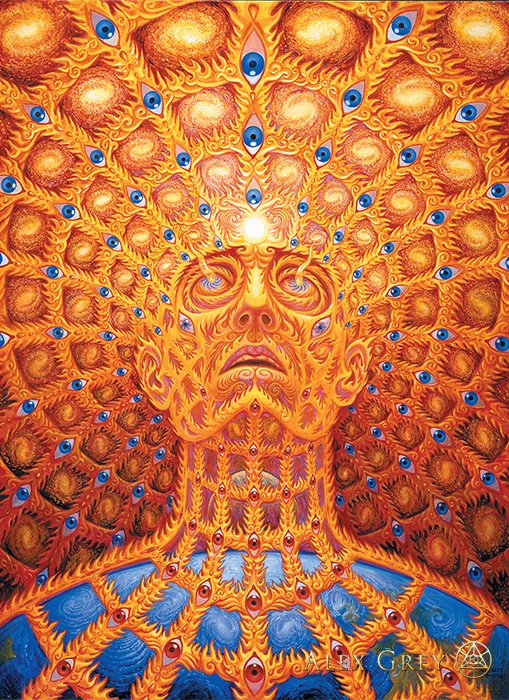
Is this experience real, or is it „just a hallucination“? It doesn’t matter; if I experienced it, then it’s true for me. The main lesson I learned is that I have nothing to fear. Life is a game I’ve already won. The point of this game is to experience life now.
Resolution
When the psilocybin wears off, the brain seems to reboot a lot of things. What’s left? A clean desktop with only one folder, „My old nonsense.“ It was a crazy trip, but now what?
First, try to remember at least what happened. It won’t be easy because the psychedelic state is very different from what we know about our perception. It reminds of a prelinguistic form of thinking based on the language of images and feelings; therefore, it is difficult to convert it into words. Write down everything you remember and understand, think about it, decipher the revelations received, talk to your therapist.
Psychedelics dramatically shift the point of view, as if you were looking at life from space. This may rebuild your value system. Psychedelics won’t change your behavior; they will show you how to change your behavior to stop suffering and be effective. However, you will have to do all the work yourself.
Today I am the Head of Design at a successful tech company; I love my job. I love my wife and daughter; I have great friends and a ton of plans. I can’t say that without psychedelics I would have lived worse — I don’t know how my fate would have developed and how I would have dealt with my psychological problems. But I know for sure that mushrooms have given me the resource to win and passionately love life. I still take psilocybin several times a year to seek advice from my inner nature at different life stages. Each trip expands my understanding of how everything works because it allows the mind to free itself from restrictions, to imagine the future as I want it to be.
I am lucky; I am not dying of cancer, I don’t have PTSD or depression, but what about people who are doing much worse than me?
Psychedelic therapy
A mental disorder is always a stuck record: the world is a cruel and dangerous place (PTSD); life is too hopeless to go on (depression); in the future, I will only have troubles (anxiety disorder). There are stuck patterns of thought and behavior, such as addiction or obsessive-compulsive disorder. These mind loops prevent you from believing that you can live differently, and you find yourself imprisoned in hopelessness, disconnected from the world and yourself.
I am lucky; I am not dying of cancer, I don’t have PTSD or depression, but what about people who are doing much worse than me?
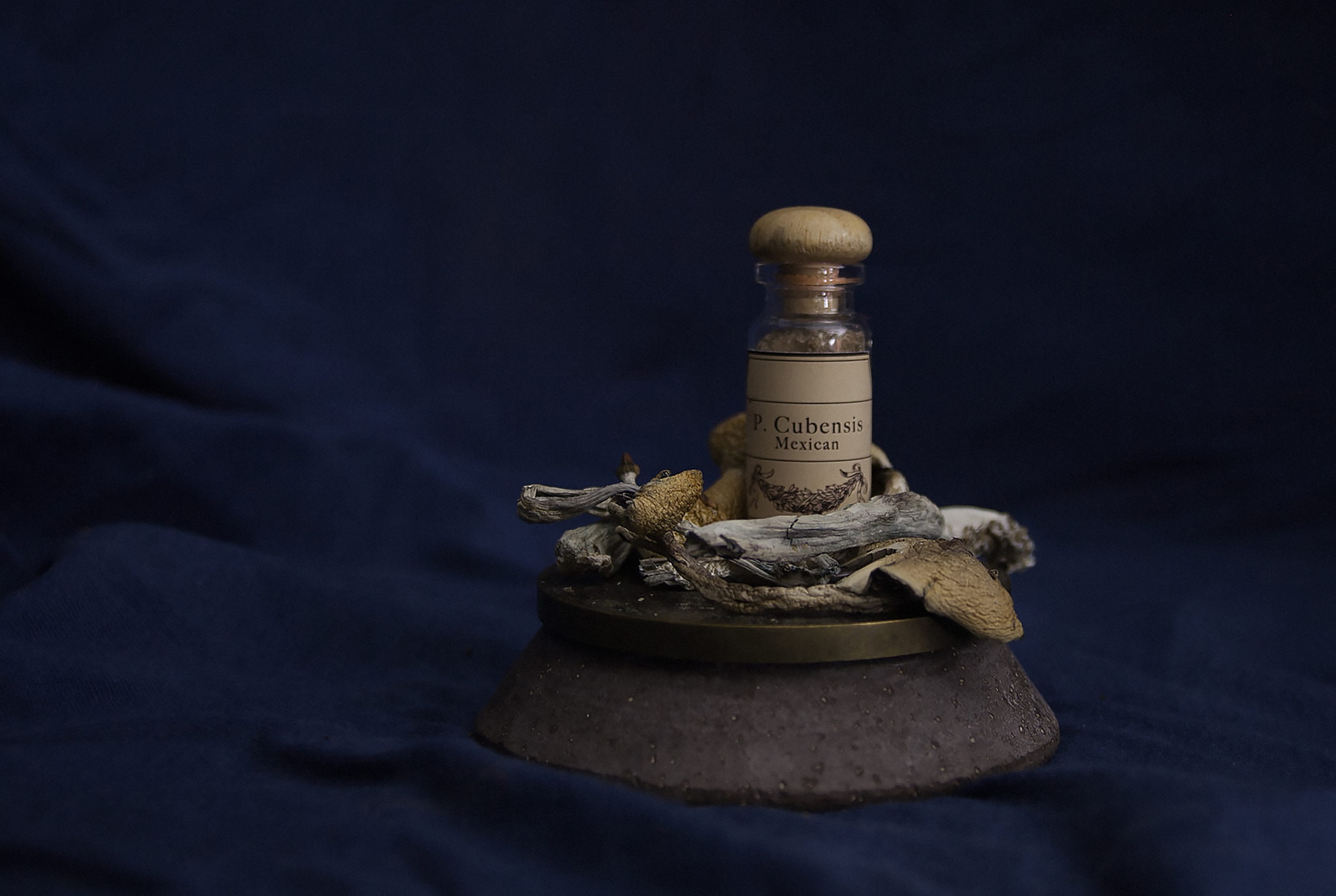
Psychedelic therapy effectively dissolves patterns and connects people with their feelings, allowing them to experience a sense of oneness with the world. It has been proven to be an effective treatment for the most common human mental disorders.
The University of California, Johns Hopkins Clinic, and New York University have conducted clinical trials of psilocybin among 92 patients with terminal cancer. A single psychedelic session cured 80% of the patients from depression, the effect persisted for six months. By comparison, after cognitive-behavioral therapy, a six-month remission is observed in 15-30% of patients. With a daily intake of antidepressants — in 60% (coupled with sexual dysfunction during administration and serious side effects when the drug is discontinued). Besides, antidepressants don’t treat the cause of depression; they make you insensitive to strong negative emotions but also strong positive emotions and experiences.
Annie Levy was a study participant at the University of California six months before her death. As she dealt with terminal cancer, Annie knew that she would soon die, and for this reason, she was so anxious that she could not think of anything but death until she got help through psilocybin therapy. Her son said at the funeral, „It was inspiring to see her slip through this [death] as if it didn’t matter.“
Sometimes, depression cannot be treated with conventional therapy. People with treatment-resistant depression took antidepressants, went through psychotherapy, and it didn’t work. 12 of them took part in a study at Imperial College London. These patients suffered from major depression for an average of 18 years. 8 out of 12 went into remission immediately after the session. Three months later, 5 of the participants remained in remission; the rest showed a significant reduction in symptoms of depression.
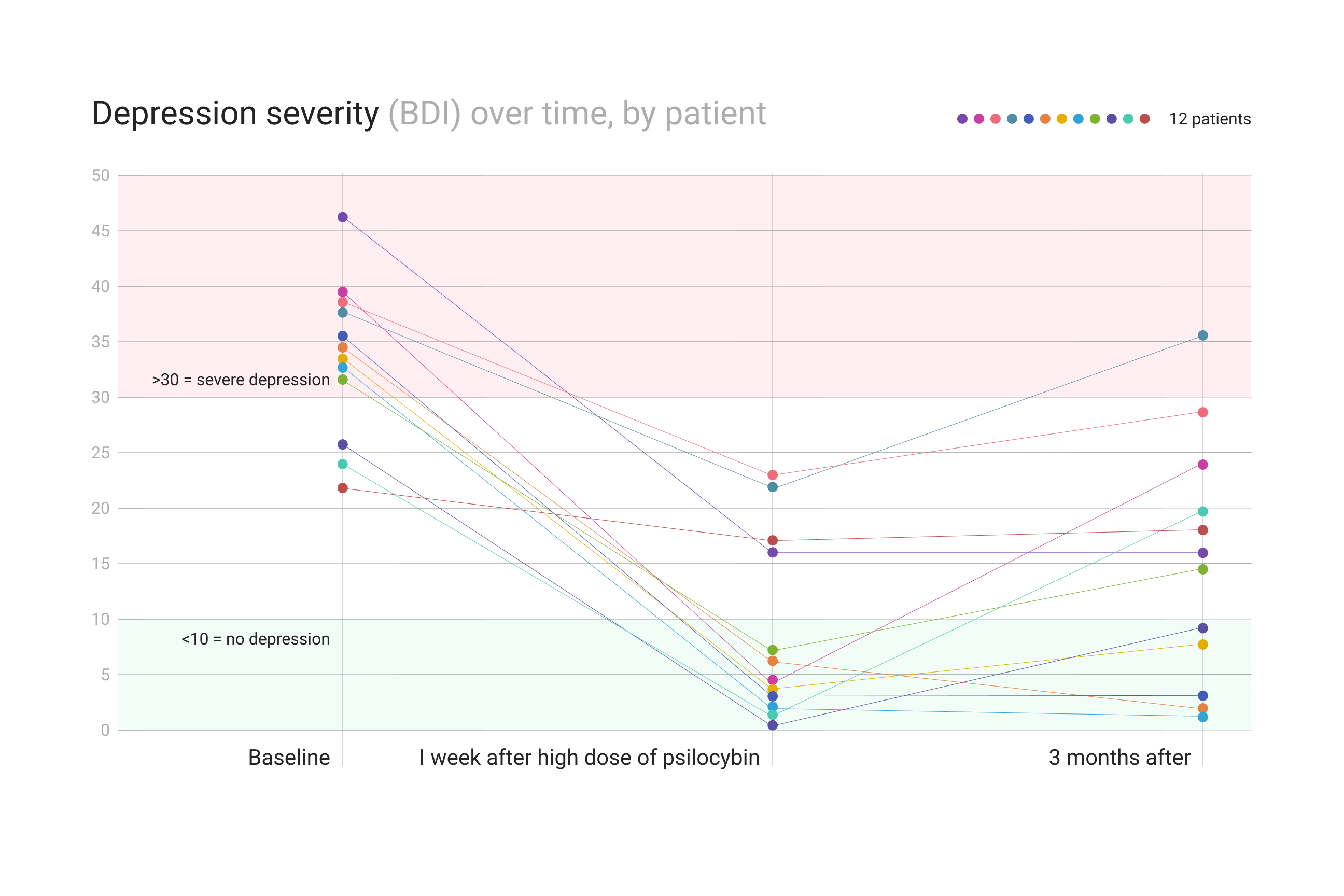
Mushrooms for independence
Johns Hopkins Clinical Study:: After undergoing psilocybin treatment, 12 (80%) of 15 participants who had smoked on average a pack a day for 30 years were tobacco-free at a 6-month follow-up. The most successful current treatment — the drug varenicline, which reduces nicotine cravings — only has a 35% success rate.
In psychedelics treatment, smoking cessation is not just a biological response, as it happens when taking drugs that affect nicotinic receptors. Psilocybin allows you to experience deep reflection about your own life and helps you ignite the motivation for change.
A team from the Johns Hopkins Clinic conducted, as well, another survey in the psychedelic community. They interviewed 343 people who had symptoms of alcohol dependence for at least seven years. After a psychedelic experience, 83% of them no longer met the criteria for alcohol dependence.
Psychological trauma and PTSD
Every day in the United States alone, 22 people commit suicide due to PTSD. In Ukraine, according to data for 2016, 500 people out of 280 thousand who took part in hostilities in Donbas committed suicide when they returned home.
The documentary „From Shock to Awe“ tells the story of two veterans who returned from the wars in Afghanistan and Iraq. These men saw their friends’ bodies torn apart; they collected body parts of children killed by their weapons to return them to their families. It was unbearable for them to live after those experiences. Their condition deteriorated despite dozens of courses of treatment until they discovered the mind-expanding world of psychedelics: in their case, it was the plant medicine ayahuasca, a brew containing the hallucinogenic substance dimethyltryptamine (DMT), used in tribal rituals in the Amazon for thousands of years to help people heal from deep emotional traumas.
Stigma
Why is psilocybin illegal?
When psychedelics were equated with drugs in the late 1960s, people knew almost nothing about serotonin, and homosexuality was considered a crime. One can imagine the misunderstanding and fear of the parents of that time at the sight of 100 thousand hippies who are bombarded with hallucinogens in the center of San Francisco. Back then, they did not tell on TV how these substances actually work. Instead, people were persuaded that psychedelics equal psychosis, jumping out the window, chromosome damage, and addiction. None of this is true, but these myths live on to this day. As David Nutt’s research shows, psychedelics are 10 times safer than alcohol.
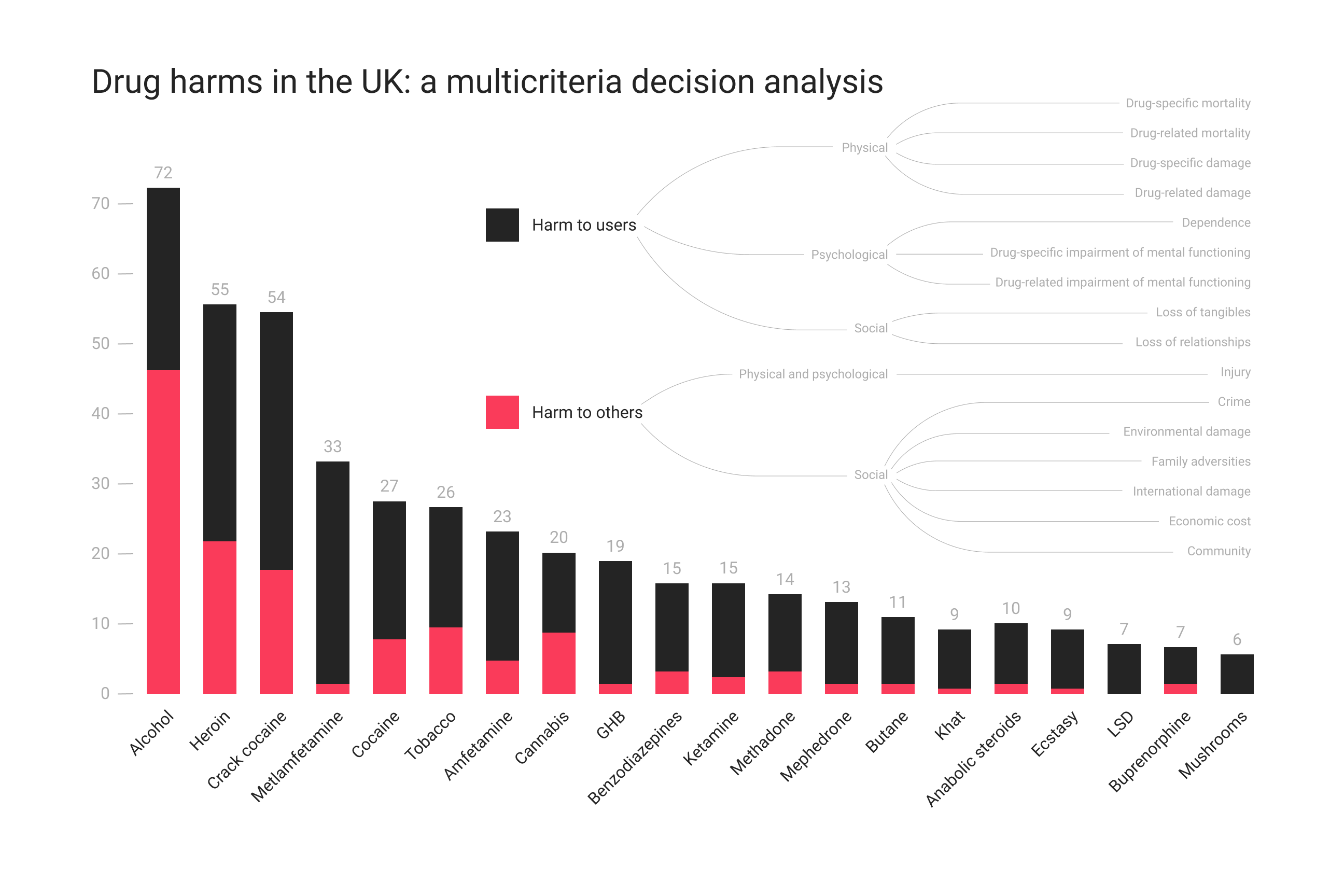
David Nutt, professor of neuropsychopharmacology at Imperial College London, was the head of the UK government’s drug policy board and was responsible for establishing a rational scale of drug harm based on two main parameters: damage to oneself and damage to others. As a result of his research, Nutt wrote in the Journal of Psychopharmacology that ecstasy is no more dangerous than equestrianism. After that, the ministry demanded his resignation.
In most parts of the world, psychedelics are in the strictest category of controlled substances, on par with heroin. This list contains substances whose use in medicine is prohibited. When psychedelic drugs were declared illegal under the UN Convention on Psychotropic Substances of 1971, on one side, people stopped swallowing these substances like candies (which is good); on the other, the ban buried psychedelics research for 40 years.
Most of the new experiments were performed on terminally ill people — not because they need it most: it was easier for them to get permission. Obtaining all the necessary licenses took about 2-3 years. Scientists had to pay $1,000 for a dose of psilocybin, while on the black market, it costs $50.
Psychedelic renaissance
Promising research results led the US Food and Drug Administration (FDA) to award psilocybin Breakthrough Therapy designation the year before last. Thus, the department has accelerated the process of obtaining permission for the use of psychedelic substances. Since then, investor interest in psychedelic treatments in the United States has skyrocketed. Over the past two years, $300 million has been invested in the sector. Before this, the record amount of collected funds was $2.8 million.
The commercial sale of psilocybin is still illegal. In the US, psychedelics can’t be sold in pharmacies, but the psychedelic experience is available as a service in licensed centers under qualified guides’ supervision. Those wishing to apply for the service will undergo a preliminary examination for contraindications such as schizophrenia and bipolar disorder.
Retreat centers already exist in Spain, the Netherlands, Mexico, Peru, and Jamaica, where psychedelic practices are legal. In the rest of the world, the only chance to get this experience is to turn to an underground guide (often a professional psychotherapist).
In Ukraine, psilocybin is in the status of „a highly dangerous psychotropic substance“. By law, its circulation is prohibited, and it cannot be used as a medicine, which means that clinical trials of psilocybin are legally impossible in our country. To legalize therapeutic practices, it is necessary to amend the law of Ukraine „On Medicines“. Next, licensing rules for psychedelic centers and the cultivation of psilocybin mushrooms will have to be developed. A training program for the guides will be needed. This is a laborious process, fortunately already taking place in Europe and the United States. The training programs are developed by the Usona Institute, California Institute for Integral Research, and COMPASS Pathways plc, which intends to be one of the first companies to make money on psychedelic medicine in the United States. Protocols for psychedelic-assisted therapy are also used in clinical trials at the University of California, Johns Hopkins Clinic, and Imperial College London. The legal framework for psychedelic services is being developed in Oregon. The petition for psychedelic services has already received the required number of signatures for official consideration in November 2020.
Why coming out is important
SWIM („someone who isn’t me“) is a term used concerning oneself in trip reports on the Internet. Erowid has published 10,000 anonymous reports. People are reluctant to talk openly about their psychedelic experiences for various reasons: to avoid being judged, for fear of losing their job, or even their freedom. I am considered a criminal in Ukraine if I keep psilocybin mushrooms at home (I am smart enough not to do so). It’s like a dystopian plot where the police harass citizens for secretly having sex with the universe.
I’m not afraid to openly declare that I take psychedelics, but I do not recommend taking any psychoactive substances. I just want to be free to do so at my own discretion. Coming out is a civil rights instrument. The stigma will go away when society sees who the psychonauts are. We are successful, educated, and productive people. We are engineers, designers, entrepreneurs, doctors, parents, family members, diligent taxpayers. We believe that changing your mind with psychedelics is a fundamental human right to psychological self-determination. We want drug policy reform to create the conditions for the research and use of psychedelics in medicine, personal development, and reducing suffering in the world.
I don’t plan to stop and will do everything in my power to fight for freedom of consciousness. I need allies: if you are a lawyer, a scientist, a physician, a public figure, if the outlined problem resonates with you, feel free to write to me.
Translated by Lubov Borshevsky
